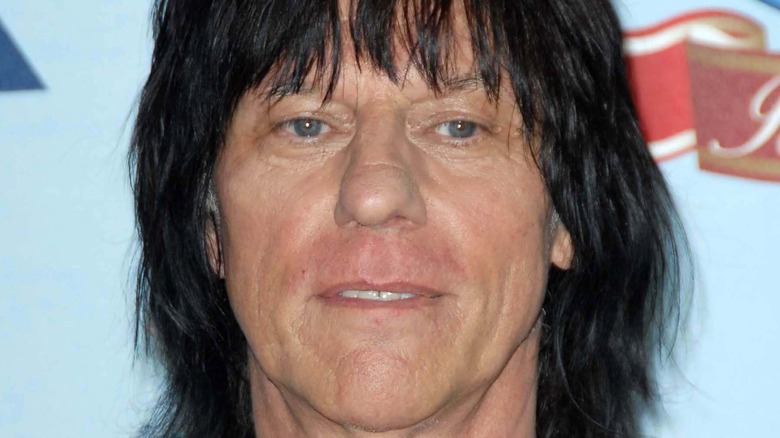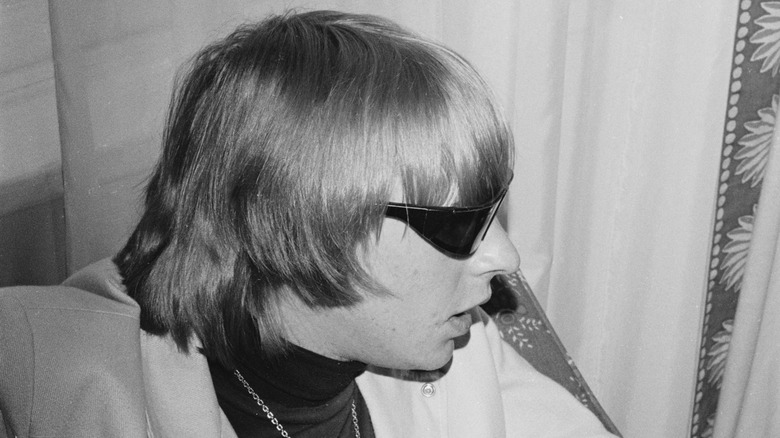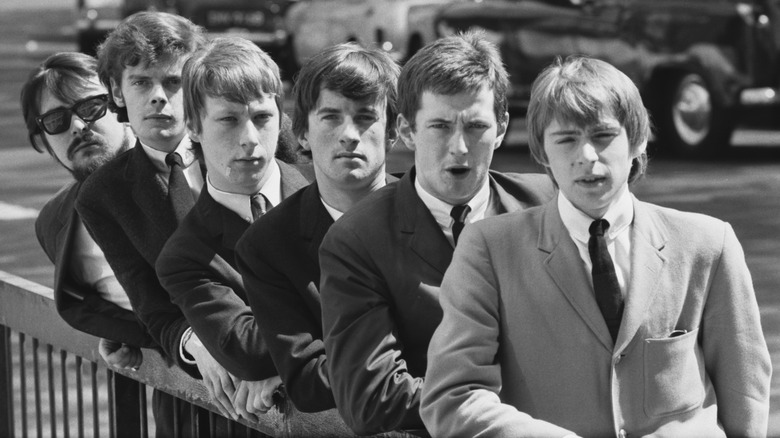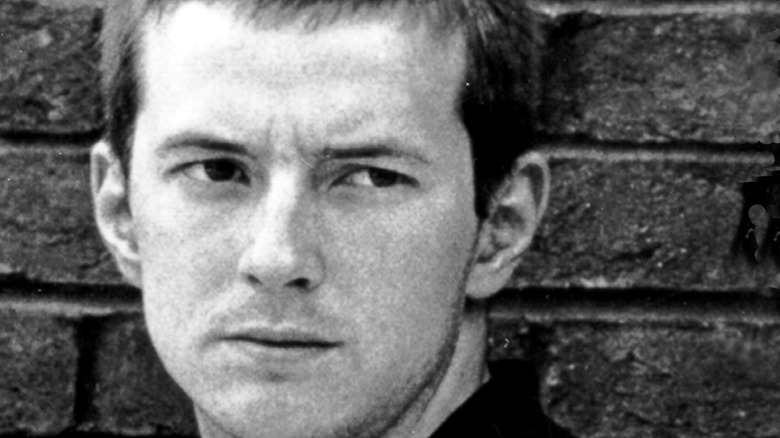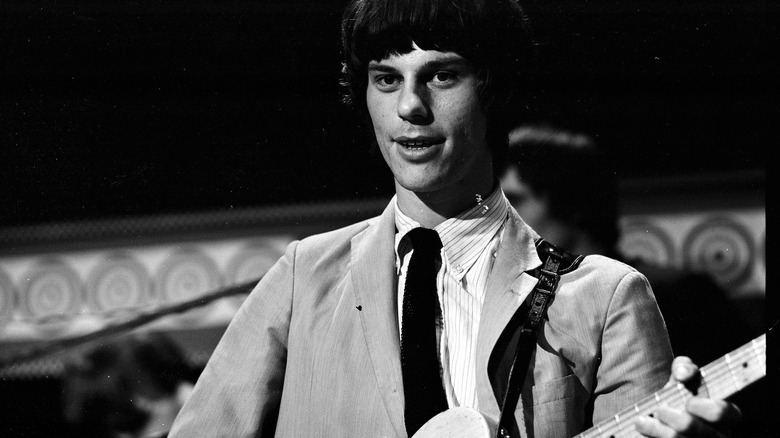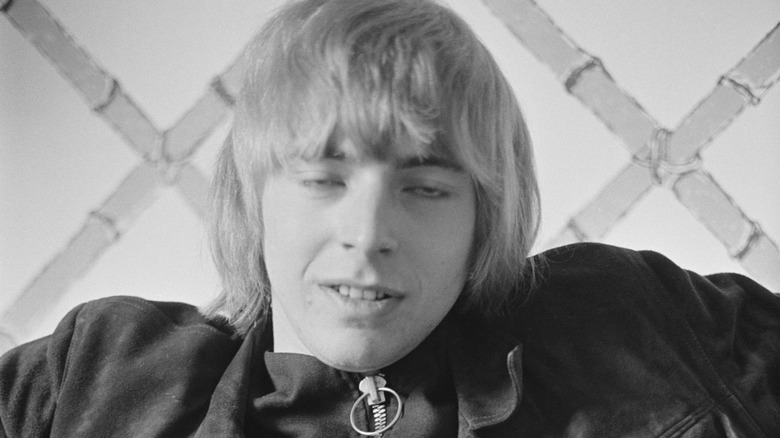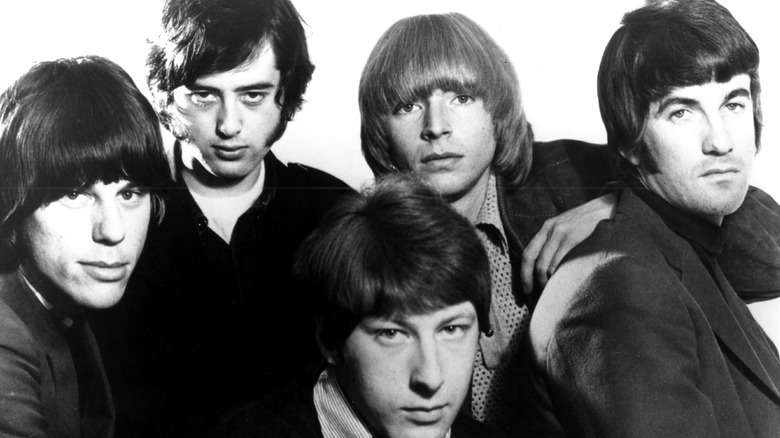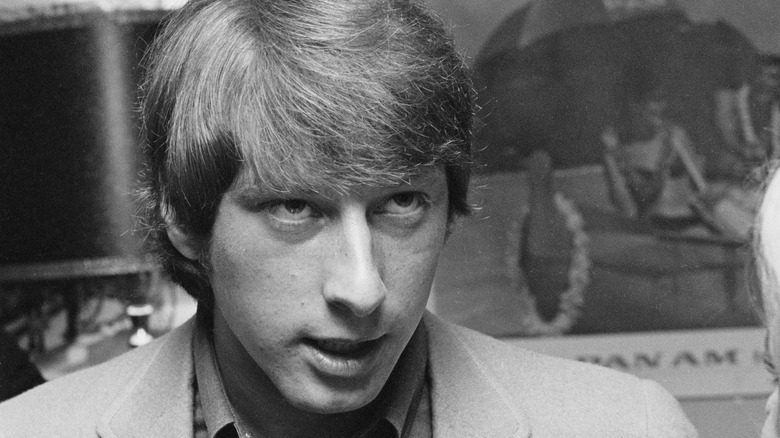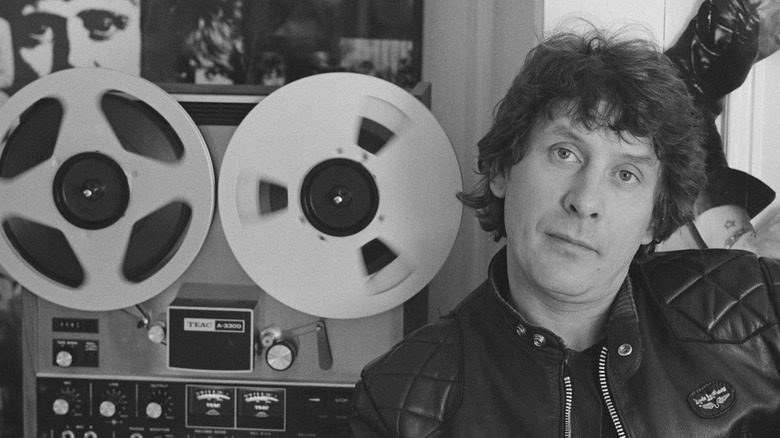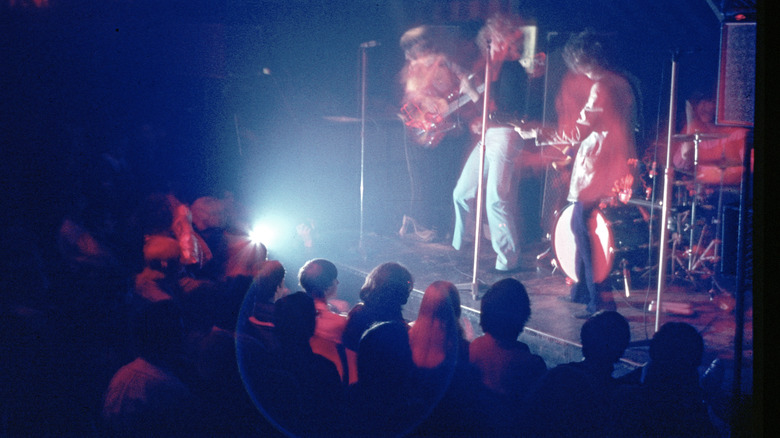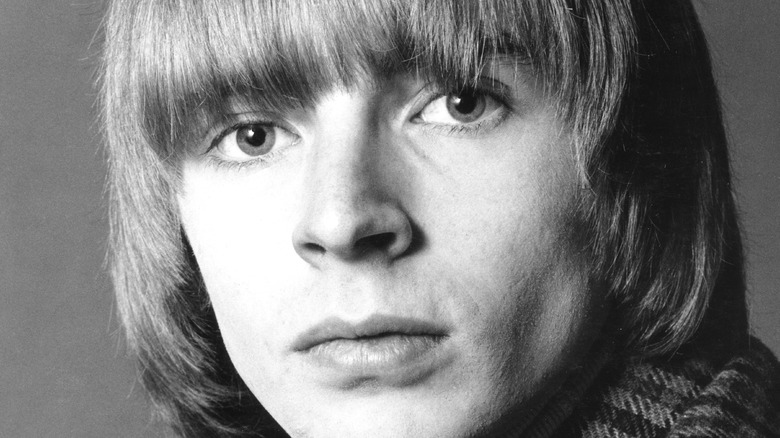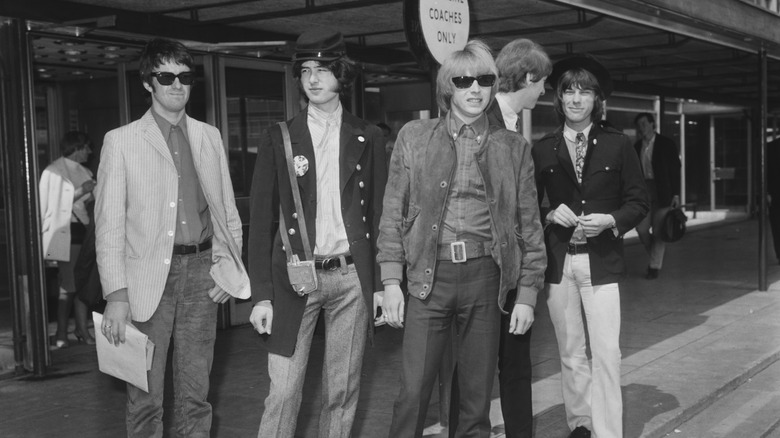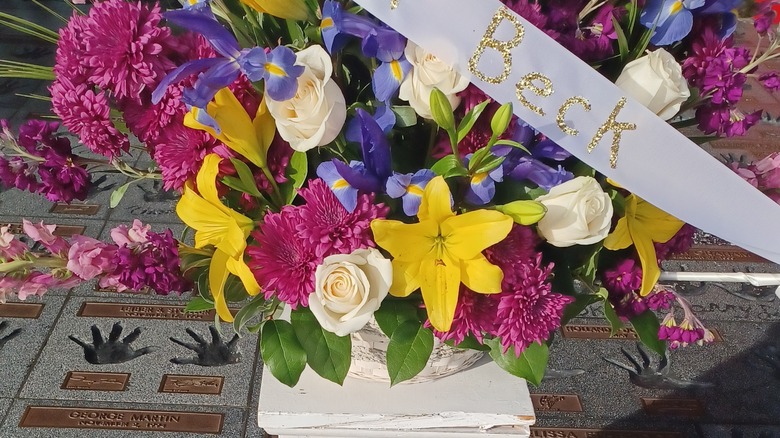Tragic Details About The Yardbirds
Over the decades, fans and critics have agreed that the Yardbirds never got the recognition they deserved. This is especially surprising given the fact that the group launched the careers of three guitar legends; not only did their roster include Jeff Beck and Jimmy Page, who played together for a brief time, but the duo was preceded by Eric Clapton, a musician so revered by fans in his prime that they referred to him as "God" (per AllMusic).
But the band's struggle to gain fame is just one part of the tragic tale of the Yardbirds, as serious accidents, illnesses, and infighting did such damage that they did not last beyond a decade in their initial run. There were significant ups and downs during that period in the 1960s — the members enjoyed much success, but it was also a time when some of their worst moments occurred. Here are some of the saddest points in the short history of such an important group of musicians.
Keith Relf was plagued with health issues since childhood
Of all the members of the Yardbirds, Keith Relf seems to have suffered the most in life. As rhythm guitarist Chris Dreja told Forbes, the singer, songwriter, and harmonica player was a supremely gifted musician, but at the same time, he endured grueling and terrifying health problems throughout his life. A prime example was when the frontman was barely out of his teens and became sidelined with a collapsed lung on his first U.S. tour with the band in 1964.
But sadly, by that point, Relf had already grown accustomed to scary incidents such as that. In his book "The Encyclopedia of Dead Rock Stars: Heroin, Handguns, and Ham Sandwiches," Jeremy Simmonds explains that the singer's severe, chronic asthma nearly killed him three times while growing up. Later on, Relf's bad luck continued as his overall condition only managed to deteriorate, with emphysema also added to his already depressing list of ailments.
Top Topham's parents forced him to quit the band
Along with lead vocalist Keith Relf, the original lineup of the Yardbirds included rhythm guitarist Chris Dreja, drummer Jim McCarty, and bassist Paul Samwell-Smith. Anthony "Top" Topham played the lead guitar at this point and was also an important part of the new group. In fact, the guitarist is the one who came up with the idea of naming the band "the Yardbirds," a play on the nickname of famous jazz musician Charlie Parker, according to AllMusic. In an interview with Record Collector, Dreja said, "Top was very much an instigator of the early band, and he was very much into the blues. Top's father had a great import collection of American electric blues records."
Topham's creative skills went beyond music, as Dreja added, "Top and I were in art school together, and he was a very talented illustrator and painter." The guitarist may have preferred to continue with both passions, but it sounds like the decision to focus on just one was made for him, forcing him to exit the group right in the beginning. Dreja explained, "The Yardbirds became professional very early on, and his parents wouldn't let him quit his art training. They grounded him from performing with the band full-time."
The loneliness of Eric Clapton while in the group
After Anthony Topham left the band, the other members were able to quickly find another blues guitarist to take his place: future legend Eric Clapton. Before Cream and his impressive solo career, Clapton was first part of the Yardbirds once he accepted the offer to join by his former art school classmate, Keith Relf. Finding such a talented replacement so quickly was certainly great for the group, but over time, Clapton realized that he did not truly belong with them. That began to cause major tension.
Clapton cared little for making pop hits, or the fame that came with them. His only desire was to play the blues, and his bandmates simply did not share that passion. The situation then deteriorated even further, as Clapton did not get along with bassist Paul Samwell-Smith and the two increasingly clashed, as Chris Dreja explained to Record Collector. Dreja and Clapton had become close friends and even roommates for a time, but Dreja understood how unhappy Clapton had become before making the decision to leave in 1965.
Not long after his departure, Rave Magazine asked Clapton if he was lonely at that stage in his life, and the guitarist replied, "Yes, as a matter of fact, I am. But not so lonely as when I was with the Yardbirds. Then it was a question of being alone within a crowd, and that is the worst form of loneliness. I lived as part of the Yardbirds until I was completely out of touch with it. I couldn't speak and be understood, and they couldn't speak to me either" (via Far Out).
Jeff Beck passed out backstage
Fortunately, the massive hole left by Eric Clapton was filled by not one, but two incredible talents by 1966: first Jeff Beck, and then Jimmy Page as well. Both played lead guitar, bringing a fascinating new dynamic to the Yardbirds (per AllMusic). But before Page was fully on board, Beck faced some serious health issues while touring in Marseille that could have easily ended his life.
In his book "Hot Wired Guitar: The Life of Jeff Beck," Martin Power describes the scary details of the night when Beck lost consciousness backstage, with the worst part being that it caused him to fall down a concrete flight of stairs. The rock star somehow avoided severely injuring himself, but when he was rushed to the hospital, a medical examination revealed that he had fainted from a bad case of food poisoning, on top of tonsillitis. Beck needed at least a few days to recover before he could get back on the road with the band.
Keith Relf's struggle with substance abuse
As the years passed and the Yardbirds became more popular, Keith Relf struggled with the pressure and increasingly relied upon unhealthy ways to get some relief. When talking with Record Collector, Chris Dreja said, "I think he found fame more difficult to live with, and as a result, retreated into alcohol and drugs." Eventually, Relf gained access to and began to use potentially dangerous substances. Dreja recalled, "There might have been a bit of LSD involved. Certainly cannabis. He did get into some sort of heroin later on."
Not only was the substance abuse terrible for the singer's already fragile health, but it also began to change his personality in negative ways as well. Relf was always sensitive to begin with, but the tension from the spotlight combined with serious addiction made him more insecure and depressed. Dreja told Forbes, "After five or six intense years on the road, he became a bit of a mess. Some people self-destruct. He had a little of that in him."
If you or anyone you know needs help with addiction issues, help is available. Visit the Substance Abuse and Mental Health Services Administration website or contact SAMHSA's National Helpline at 1-800-662-HELP (4357).
Jeff Beck was fired
As the Yardbirds spent much of their time on the road, sometimes even putting on two performances in a night, the pressure took its toll on Jeff Beck until he could no longer take it. While the band was on tour during the winter months in the Midwest, Chris Dreja recalled to Record Collector, "Jeff had a bit of a breakdown, where he smashed up his guitar, and headed for LA." That was the last straw for his bandmates, who had already grown tired of Beck's sour attitude. They made the tough decision that his time with the group was over.
Even though Beck had made the mistake of abandoning his fellow members, leaving the band was not his intent, so it was painful to learn that he was out for good. In an interview with Total Guitar, he said, "I was pretty down at the time — I'd lost my girl, Hendrix had come and smeared everybody across the floor ... it wasn't looking too rosy. I'd fallen out with the Yardbirds — whatever happened I was out, and I'm facing a Monday morning just outside London thinking, What's the point? It's all gone against me."
The band entered a downward spiral in sales
Even before Jeff Beck was fired from the band, the Yardbirds began to enter a commercial slump that they never really got out of. As Bob Spitz points out in his book "Led Zeppelin: The Biography," the band's last notable single, "Happenings Ten Years Time Ago," didn't make it into the Top 40, but that was just the beginning of their downfall.
Despite a major effort to reverse the trend, their following work, 1967's "Little Games," fared far worse, according to AllMusic. Not only was the album disliked by many fans, but a former band member hated it as well. In his book "Jimmy Page: The Definitive Biography," author Chris Salewicz quotes Jeff Beck as saying, "When I heard 'Goodnight Sweet Josephine,' I thought, 'Thank God I left the Yardbirds.'"
As a way to make up for their lack of chart-topping singles, the group continued to tour heavily, especially throughout the U.S. However, they struggled even harder to stay relevant in an evolving music scene with the revolutionary sound of rock stars like Jimi Hendrix, Pink Floyd, and The Who. Back home in the U.K., the band was increasingly forgotten because of these new acts.
Producer Mickie Most failed the band
Near the end of the initial run of the Yardbirds, the band attempted one last strategic move that they hoped would reverse their declining sales and put them back on track toward success. To do so, they hired producer Mickie Most, who had helped several other artists such as the Animals and Donovan create dozens of singles that climbed the charts, according to AllMusic. Unfortunately, Most's contribution did the exact opposite for the Yardbirds and led to disaster for the group.
First of all, Most's methods were incredibly frustrating, especially for Jimmy Page. In Bob Spitz's book "Led Zeppelin: The Biography," Page described how the singles were recorded and said, "It was just so bloody rushed ... everything was done in one take." He also added, "On half the tracks we didn't even hear the playbacks." The guitarist always wanted to refine each song to create the best product, but that approach was not possible under the direction of Most.
Even worse was the fact that the producer was falling behind the times in his mentality. Not only did Most completely ignore the new music of rising bands, but he also was outdated with his focus on only making hits. Page explained, "Mickie Most couldn't come to terms with albums. It was still only singles that were important to him." When talking about the terrible tracks on "Little Games," Page said, "We were conned into those singles."
The Yardbirds broke up
In 1968, Jimmy Page still hoped the Yardbirds could turn things around, but eventually he could see the writing on the wall: The band was done. In Bob Spitz's book "Led Zeppelin: The Biography," the guitarist recalled, "I used to say, 'Come on, let's make an effort.' But it had all gone." He continued with sadness and some frustration and said, "I didn't want the Yardbirds to break up, but in the end, it was too much of a headache."
Even before Keith Relf and Jim McCarty quit the band, a rift began to form between them and Page simply because they no longer wanted to make the same kind of music. While the guitarist focused on a progressive sound like his future group, Led Zeppelin, would later be known for, the singer and drummer were far more interested in calmer acoustic tunes. Chris Dreja, on the other hand, appeared to have lost much of his desire to remain a musician altogether, and instead wanted to transition into photography and live with his girlfriend in the U.S.
The tension behind the scenes culminated in a heated argument at a Holiday Inn about whether or not to accept a lucrative offer to play a show in Miami Beach for $5,000. Relf and McCarty could have cared less for the cash, so it did not persuade them to take the gig, but Page and Dreja were more inclined to keep the Yardbirds going. The ugly fight that ensued resulted in the dissolution of the band.
The tragic death of Keith Relf
In 1994, Chris Dreja teamed up with Jim McCarty to bring back the Yardbirds, but for a horrible reason, Keith Relf could not join them. In 1976 — less than a decade after the collapse of the band — the singer-songwriter was still devoted to music and had just founded a group called Illusion, writes Jeremy Simmonds in his book "The Encyclopedia of Dead Rock Stars: Heroin, Handguns, and Ham Sandwiches." However, Relf would not live to see his aspirations for the new act come to fruition.
One tragic day, Relf's son, Daniel, made his way to Relf's studio only to discover that his father had died in a freak accident. While Relf was playing his guitar, the instrument was not grounded properly, so when he moved over a hidden gas line, the musician was fatally electrocuted. The power surge had been relatively small, but given his poor health to begin with, it caused severe damage. When talking with Record Collector, Chris Dreja said, "I think you and I, hopefully, could have taken that shock and probably survived, but we didn't have one lung missing. We didn't have the effects of alcoholism and drug addiction, plus asthma, which he suffered from dreadfully."
The tragedy did not end there, as the rock star's final resting place did not receive the care it deserved. Dreja recalled to Forbes, "I remember going to the funeral, in a quiet graveyard in Richmond [England]. I think he was in an unmarked grave for years. The family finally did get around to putting up a plaque."
The Yardbirds are overshadowed by other famous bands
The Yardbirds may be one of the greatest original rock and R&B bands of all time, but they are not nearly as well-known as several other bands who thrived in the same era. Even back when they were most active in the 1960s, each member was fully aware of the fierce competition they faced. In an interview with Sonic Breadcrumbs, drummer Jim McCarty admitted, "We were pretty desperate, because a lot of, well ... 'desperate' is a funny word, but there were a lot of bands that were in the same era, and they were all having hits. The Animals, the Stones obviously, the Beatles, the Kinks, they were all having hits except for us."
It can be difficult to believe that a band that included such esteemed guitarists as Eric Clapton, Jeff Beck, and Jimmy Page could not do better, but in an essay written in 1970, rock critic Lester Bangs offered an explanation. He said, "The musicians in the Yardbirds were just too good, too accomplished and cocky to do anything but f*** up in the aftermath of an experiment that none of them seemed to understand anyway."
The Washington Post elaborated on this major dilemma and pointed out that the band often struggled to find its identity. The bandmates had a solid foundation in blues, but they could never abandon pop because it provided the funds necessary to keep playing music. Unable to settle on one direction, they failed to equal the success of the rising stars surrounding them.
Jeff Beck died unexpectedly of meningitis
In 2023, another major blow was dealt to the Yardbirds when they lost former member Jeff Beck. After contracting bacterial meningitis, the guitarist's condition rapidly worsened, leading to his death on January 10, 2023. A source close to Beck told People, "The sickness came on really quickly and it all deteriorated rapidly in the last couple weeks." Although the illness was brief, the 78-year-old was fortunate to have what little time he had, as it allowed him to see several loved ones one final time before his passing. According to the CDC, the swelling around the brain and spinal cord that results from such infections can be so harmful that in some individuals it can lead to death in just a matter of hours.
Among the family and close friends who visited Beck were fellow rock stars and celebrities, including Johnny Depp. Per Variety, Depp and Beck toured together in 2022 to promote their album "18." The source interviewed for People explained, "They had a really tight friendship, they were extremely close, and he got even closer over this past summer when they were touring together." They then added, "Johnny is still processing this news. He's devastated."
